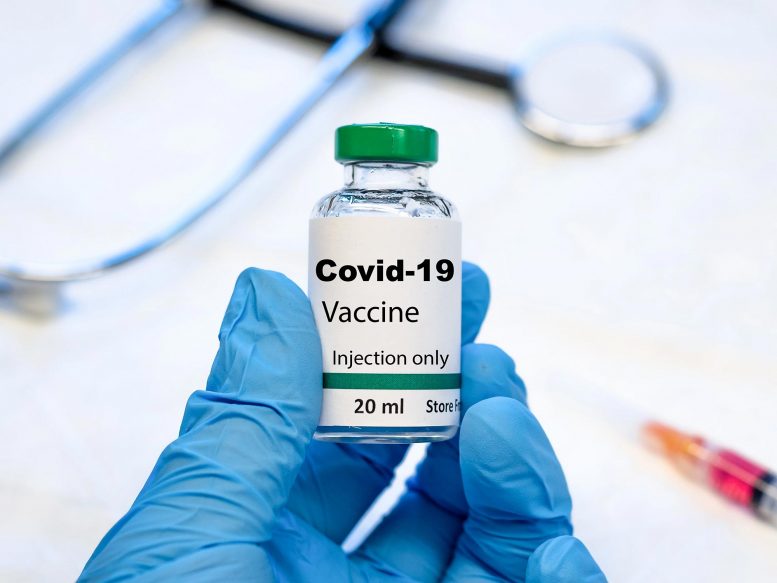[ad_1]

People who’ve beforehand had COVID-19 have an enhanced antibody response with a single dose of RNA vaccine, finds new analysis co-led by UCL researchers.
These are the findings of a research, printed as a analysis letter* in the Lancet, of 51 UK healthcare employees, round half of whom had a earlier laboratory-confirmed SARS-CoV-2 an infection.
It confirmed {that a} single dose of Pfizer/BioNTech’s RNA vaccine resulted in a considerably enhanced immune response towards the virus, in comparison with a single dose in these with out prior an infection. The enhanced response was no less than an order of magnitude larger than after a traditional two-dose vaccine schedule in a beforehand uninfected particular person.
The researchers warning that whereas the findings add to the rising image of COVID-19 immunology, they need to not affect present vaccination coverage in the UK or discourage folks from reserving a second booster vaccination by means of the NHS COVID-19 vaccination program.
However, they add the findings have the potential to tell future vaccination methods to incorporate serology testing (often known as anti-body testing) on the time of the primary vaccination to allow the second, booster dose to be prioritized for beforehand uninfected people. Researchers clarify that such an strategy might speed up vaccine roll-out by stretching vaccine provides additional.
The analysis is a collaboration between scientists at UCL, Public Health England, Barts Health NHS Trust, Royal Free London NHS Foundation Trust, QMUL and Imperial College London – companions in the COVIDsortium** led by Professor James Moon and supported by Professor Charlotte Manisty (each UCL Institute of Cardiovascular Science).
Professor Moon mentioned: “These published peer-reviewed results shows that healthcare workers who had previously had COVID-19 make a huge antibody response to the first vaccine dose which effectively acted as a boost.”
Prime/Boost strategy
Most accredited COVID-19 vaccine platforms depend on a two-dose strategy – an preliminary primer, adopted by a booster dose a number of weeks later – to generate an immune response towards the spike protein on the floor of the virus. This consists of the Pfizer and AstraZeneca vaccines at present being rolled out in the UK.
However, regardless of rising proof of actual world effectiveness of the vaccines, the influence of prior SARS-CoV-2 an infection on dose routine is unclear/nonetheless rising.
In the newest research, researchers checked out antibody knowledge from healthcare employees enrolled in an ongoing observational research (COVIDsortium**).
All individuals underwent weekly PCR and serology testing from the date of first UK lockdown in March 2020, for 16 weeks. From a pattern of 51 individuals, 24 had a previous COVID-19 an infection confirmed with a laboratory PCR take a look at. Participants got a single dose of the Pfizer/BioNTech mRNA vaccine, and bloodwork was analyzed three weeks later.
Following a single dose of the Pfizer vaccine, individuals produced antibodies towards the spike protein. In these with out prior an infection, ranges of spike-protein antibodies had been just like peak ranges measured seen in people with delicate SARS-CoV-2 an infection.
However, these with prior an infection produced high ranges of antibodies towards the spike protein after a single dose, in comparison with these with out prior an infection, indicating a considerably enhanced antibody response.
Blood evaluation of the 24 confirmed that antibody response (anti-S response) elevated 140-fold on common following a single dose of vaccine, in comparison with their peak pre-vaccine antibody ranges – after their an infection however earlier than their first vaccination.
The UCL Immunology lead for this research, Professor Mahdad Noursadeghi (UCL Division of Infection & Immunity), added: “Prior infections in this group date back to the beginning of the epidemic in London. The fact that a vaccine dose almost a year later has such a boosting effect, highlights the longevity of immune memory to this infection and increases our confidence that booster vaccines at intervals may be an effective way to may maintain high levels of immunity in the future.”
Study limitations
The researchers stress that these findings relate to these with laboratory-confirmed infections solely at this stage and don’t take note of variables reminiscent of the quantity of virus (viral load) which brought about the preliminary an infection, individuals age, detailed health standing or the severity of their an infection.
The research was additionally restricted to the Pfizer/BioNTech mRNA vaccine in a small group of healthcare employees with and with out lab-confirmed an infection. It can not, at this stage, be utilized extra typically to different teams – reminiscent of older adults, folks with underlying health circumstances – or to different vaccines.
They authors clarify that the findings add to the rising image of immunological safety towards SARS-CoV-2 and will inform different packages all over the world the place vaccine provides could also be restricted.
In follow, laboratory-based testing may very well be used to display screen sufferers for antibodies towards the spike protein earlier than their first vaccination. This might assist to speed up rollout by reallocating doses of vaccine and prioritizing sufferers who might obtain larger extra profit from a second dose, in comparison with these with ample response from a single dose.
Reference: “Antibody response to first BNT162b2 dose in previously SARS-CoV-2-infected individuals” by Charlotte Manisty, Ashley D Otter, Thomas A Treibel, Áine McKnight, Daniel M Altmann, Timothy Brooks, Mahdad Noursadeghi, Rosemary J Boyton, Amanda Semper and James C Moon, 25 February 2021, Lancet.
DOI: 10.1016/S0140-6736(21)00501-8
*Research letters printed in the Correspondence part embody analysis findings and are externally peer-reviewed. Unlike Articles containing unique knowledge, analysis letters are shorter and the analysis they comprise is often preliminary, exploratory, or reporting on early findings.
**COVIDsortium: The COVID-19 Consortium is a longitudinal research of UK healthcare workers initiated in March 2020. The research goals to grasp the immune response to COVID-19.
[ad_2]